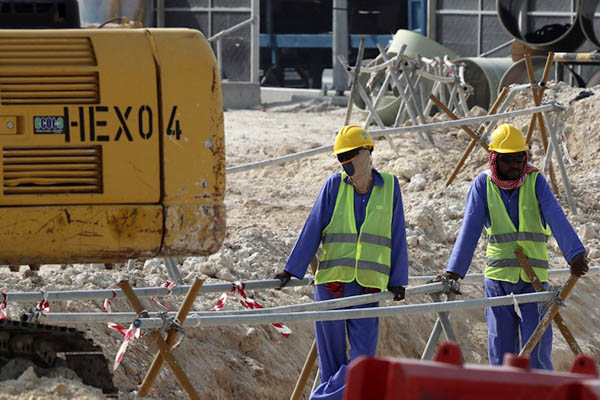
AFP
Gulf state’s reforms will include abolishing requirement for some workers to obtain employers’ permission to change jobs, exit country
Qatar announced plans on Wednesday to scrap key aspects of its controversial “kafala” labor rules, including the requirement for some workers to obtain employers’ permission to change jobs and exit permits to leave the country.
Qatar has made a series of reforms to its employment regulations since being selected to host the 2022 World Cup, which set motion a vast construction program employing foreign workers. Rights groups have long said the system fuels abuses.
Last year, the exit visa requirement was dropped for the majority of workers, but the authorities are now extending that to the remainder, including domestic staff and employees of government bodies including Qatar Airways. “Cabinet has adopted new legislation related to a new law for minimum wage and also a new regulation to facilitate labor transfer to a new employer… and a draft law to abolish exit permits,” Labour Minister Yousuf Mohamed al-Othman Fakhroo said.
The proposals will now be drafted formally “within a month or so” and should become law by “around the end of the year,” he told AFP.
Just 333,000 of the country’s 2.7 million people are Qatari citizens, according to official statistics.
Speaking on the sidelines of an event marking the centenary of the International Labour Organization (ILO), Othman said the new regulations aimed to make Qatar “an attractive place for investors, for skilled workers.” He did not specify the level of the new minimum wage, but the government had set it temporarily at 750 riyals ($206) per month.
An Indian worker in the textiles industry, who declined to be named, said Qatar needed to do more but the move was “definitely a start.”
“They have labor laws but how many people come forward to complain? People don’t come forward because they don’t want to lose their jobs,” the worker said.
Some two million foreigners work in Qatar, many employed directly or indirectly on vast infrastructure projects for the 2022 World Cup. In February, the gas-rich Gulf state said it was committed to labor reforms, following an Amnesty International report that it was failing to stop widespread abuse of workers.
Doha said it was on course to deliver “lasting” change after the rights group said it was “running out of time” to implement the reforms before the football contest.
The ILO praised Qatar for the latest “sweeping reforms” and voiced hope that other countries with similar systems would follow suit. “With these announcements we can officially announce the abolishment of kafala,” said the head of the U.N. agency’s Qatar project office, Houtan Homayounpour. “It is huge news for the millions of workers who are here and the State of Qatar.”
Regional analyst and King’s College London assistant professor Andreas Krieg said the reforms “were the final step in liberalizing the labor market in Qatar.”
“The Qataris feel the pressure from the international media to make changes and they really recognized this since 2017 that they have to make concessions and improvements—and they have,” he said.
